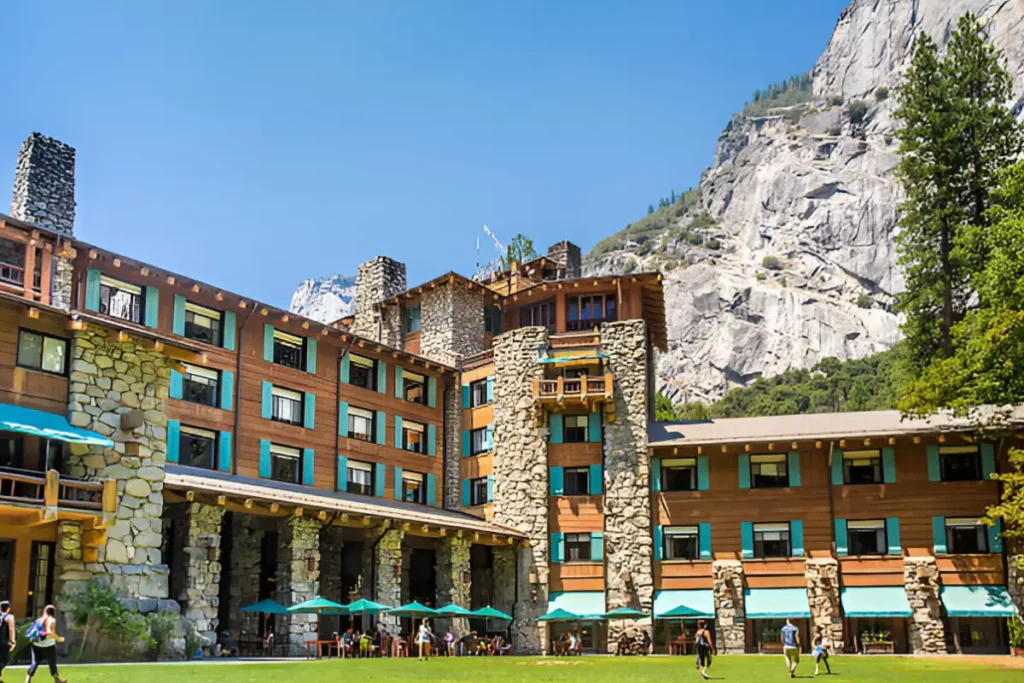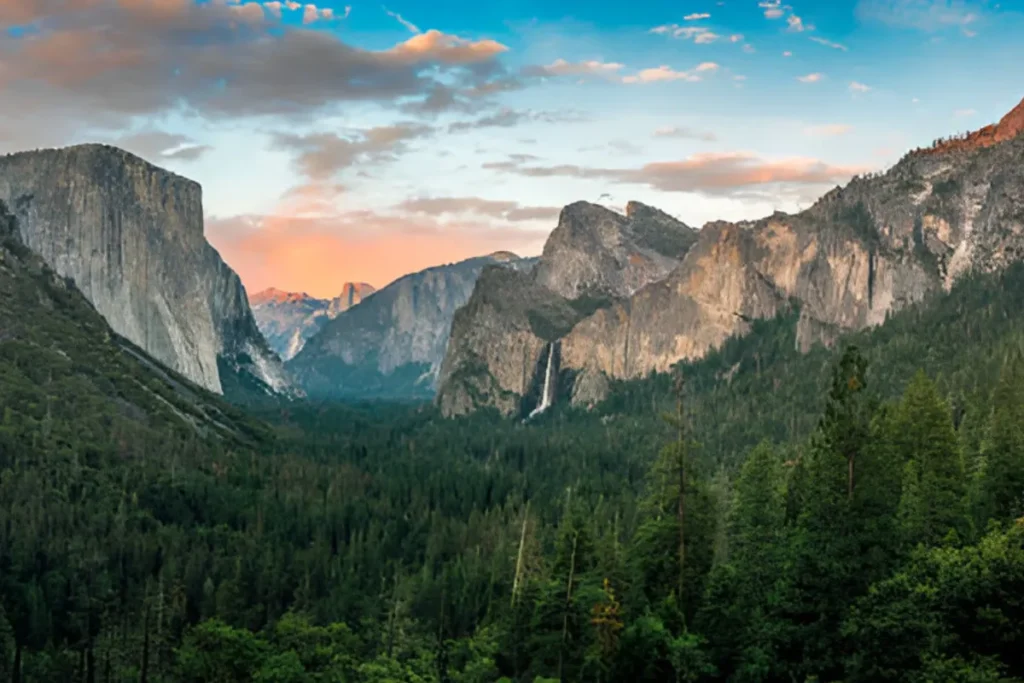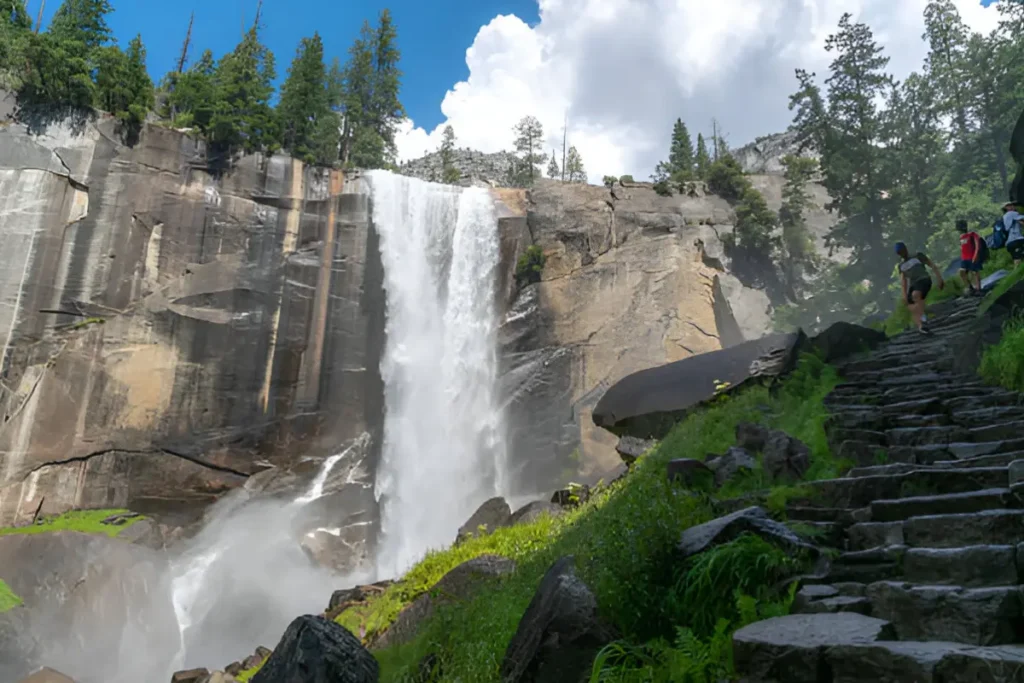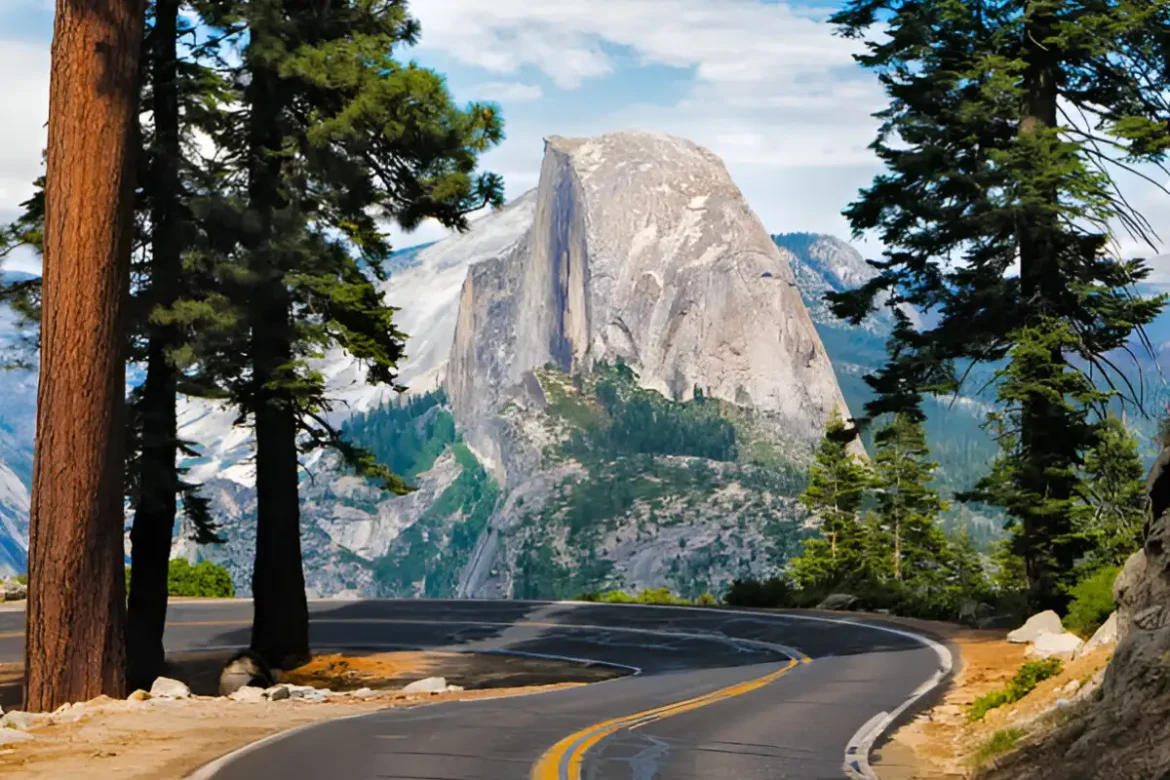Table of Contents
Are you ready for an unforgettable journey to a breathtaking natural wonder? Yosemite National Park is famous for its towering cliffs, waterfalls, and serene meadows. It’s a place that captures your senses and leaves a lasting impression.
But, where do you start when planning your Yosemite adventure? This guide will help you create the perfect itinerary. We’ll show you how to make the most of your time in this awe-inspiring park.
We’ll cover everything from the best time to visit to the hidden gems that will amaze you. So, are you ready to discover the magic of Yosemite?
Introduction to Yosemite National Park
Yosemite National Park is a stunning natural wonder in California’s Sierra Nevada mountains. It’s famous for its huge granite cliffs, beautiful waterfalls, ancient sequoia trees, and vast wilderness. Millions visit each year to see its amazing landscapes.
Yosemite was created in 1890 and spans nearly 1,200 square miles. It offers many natural wonders and outdoor activities. From Yosemite Valley’s iconic cliffs to Tuolumne Meadows’ peaceful meadows, it’s a paradise for nature lovers and adventurers.
The park’s varied landscapes and ecosystems are home to many plants and animals. You can see ancient sequoia trees and witness the beauty of El Capitan, Yosemite Falls, and Half Dome. It’s a chance to explore the park’s rich history and natural wonders.
Yosemite is perfect for a day hike, a long backcountry trip, or just enjoying nature. It offers an unforgettable outdoor experience that will stay with you forever.
| Fact | Value |
| Established | 1890 |
| Area | Nearly 1,200 square miles |
| Iconic Landmarks | Yosemite Valley, El Capitan, Yosemite Falls, Half Dome |
| Unique Ecosystems | Sequoia forests, meadows, granite cliffs |
Best Time to Visit Yosemite
Yosemite National Park is a stunning natural wonder that captivates visitors year-round. The best time to visit depends on your preferences and the experience you seek. Let’s explore the highlights of two popular seasons – spring and summer.
Spring in Yosemite
Spring in Yosemite is magical. The park awakens from winter, and waterfalls are filled with snowmelt. Wildflowers bloom, adding vibrant colors to the landscape.
Temperatures are mild, making it perfect for hiking and exploring trails. It’s an ideal time to see Yosemite without the crowds of peak season.
Summer in Yosemite
Summer is Yosemite’s peak season. Long, warm days are perfect for exploring the park’s wonders. You can see iconic cliffs, serene lakes, and diverse wildlife.
Summer offers a quintessential outdoor experience. Hiking, camping, and water activities like swimming and rafting are popular. It’s a great time to enjoy Yosemite’s beauty.
Planning your visit to Yosemite with an understanding of the yosemite national park weather conditions is key. From snow-capped peaks in spring to sun-drenched trails in summer, Yosemite’s beauty shines in every season.
Getting to Yosemite National Park
Yosemite National Park is in central California, drawing millions yearly. Getting there is easy, with major highways from nearby cities. The trip offers stunning views and a chance to see the park’s beauty.
California Highway 140 is a main route to Yosemite’s west entrance. It shows off the Sierra Nevada and Merced River canyon. You can also enter through the south on Highway 41 or the east on Highway 120.
A map for Yosemite National Park is helpful for navigating. It lets you explore Yosemite’s trails and roads. This way, you can see the park’s diverse ecosystems and wonders.
Knowing the park’s layout and transport options is key for a great visit. Yosemite offers scenic drives and hiking trails. There’s endless fun to be had in this amazing national park.
Where to Stay in Yosemite
Yosemite National Park has many places to stay, from grand hotels to cozy campsites. It’s perfect for everyone, whether you want luxury or adventure. Let’s look at the best places for your trip.
Yosemite National Park Hotels
Yosemite’s historic hotels offer a luxurious stay. The Ahwahnee is a stunning stone and timber building with amazing views. It’s a top choice for those looking for luxury.
Curry Village and Yosemite Lodge also offer great stays. They have a rustic feel and are close to the park’s wonders.
Camping in Yosemite
Yosemite is famous for its campsites, perfect for RVs and tents. You can camp in Yosemite Valley or Tuolumne Meadows. Each site has its own charm and is close to attractions.
Yosemite has both developed campsites and quiet backcountry spots. It’s the perfect place to enjoy nature.

Yosemite has something for every traveler, from luxury hotels to campsites. Whether you prefer the grandeur of lodges or the adventure of camping, your stay will be unforgettable.
Top Attractions in Yosemite National Park
Yosemite National Park is filled with iconic natural spots. Each one offers a unique and breathtaking experience. From the vast Yosemite Valley to the massive granite monoliths of El Capitan and Half Dome, these landmarks show the park’s incredible beauty and geological wonders.
Yosemite Valley
The heart of Yosemite National Park, Yosemite Valley is stunning. It has towering cliffs, waterfalls, and lush meadows. Visitors can walk along the valley floor or hike to scenic spots for amazing views.
El Capitan
El Capitan towers over Yosemite Valley. It’s famous for rock climbing and is a must-see. This giant granite monolith is over 3,000 feet tall and is awe-inspiring to see from the valley floor or while climbing it.
Half Dome
Half Dome is one of Yosemite’s most famous sights. It’s a granite dome over 4,800 feet above Yosemite Valley. Hiking to the summit is challenging but offers incredible 360-degree views of the park.
| Attraction | Elevation (feet) | Description |
| Yosemite Valley | 4,000 | Expansive valley with towering cliffs, waterfalls, and lush meadows |
| El Capitan | 7,569 | Iconic granite monolith, a renowned rock-climbing destination |
| Half Dome | 8,836 | Granite dome with a strenuous but rewarding hiking trail to the summit |

Hiking Trails in Yosemite
Yosemite National Park is famous for its many hiking trails. Each trail offers a special way to see the park’s stunning views. The Vernal Fall Trail and the Mist Trail are two favorites, giving hikers amazing experiences.
Vernal Fall Trail
The Vernal Fall Trail is a tough but rewarding hike. It takes you to the beautiful Vernal Fall. The trail goes through a green forest, over a bridge, and up steep paths to the waterfall.
The sound of the water and the mist make it a truly amazing place.
Mist Trail
The Mist Trail is another top choice in Yosemite. It lets hikers see Nevada Fall and Vernal Fall up close. This hard 7-mile hike starts with steep steps and then follows a rocky path.
When it’s wet, the path can be slippery. But the views of the waterfalls and cliffs are worth it.
| Trail Name | Distance | Difficulty | Highlights |
| Vernal Fall Trail | 3.5 miles round-trip | Strenuous | Stunning Vernal Fall, Lush Forest |
| Mist Trail | 7 miles round-trip | Strenuous | Majestic Nevada Fall and Vernal Fall, Granite Cliffs |
Yosemite’s trails offer something for everyone, from tough hikes to easy walks. The vernal fall and mist trail are two of Yosemite’s most iconic spots.

Yosemite National Park Map
Exploring Yosemite National Park is easier with its detailed map. This map shows major roads, trails, and landmarks. It helps visitors plan their trip and see all the park’s highlights.
The map is like a guide to Yosemite’s wonders. It leads to famous spots like Yosemite Valley, El Capitan, and Half Dome. With it, you can find important places, plan hikes, and discover secret spots.
For both new and experienced visitors, the map is key. It helps you enjoy Yosemite to the fullest. By using the map, you’ll make lasting memories.
The map also shares info on park amenities. It lists campgrounds, visitor centers, and places to eat. This makes planning your trip smooth and fun.
In short, the Yosemite National Park map is essential for exploring. By using it to plan your visit, you’ll have a great time and make unforgettable memories.
Mariposa Grove of Giant Sequoias
Yosemite National Park is home to the Mariposa Grove of Giant Sequoias. This forest has hundreds of ancient trees, some over 2,000 years old. Visitors are amazed by the size and beauty of these giants, reaching up to 300 feet tall and 30 feet wide.
Walking through the Mariposa Grove is a humbling experience. There are hiking trails that let you see these giants up close. The Grizzly Peak Trail and the Mariposa Grove Loop are favorites, offering breathtaking views.
| Tree Name | Age (Estimated) | Height (Feet) | Diameter (Feet) |
| Grizzly Peak | 2,700 years | 209 | 27 |
| Faithful Couple | 1,800 years | 267 | 29 |
| Fallen Monarch | 1,500 years | 209 | 21 |
The Mariposa Grove shows the strength and long life of giant sequoias. These trees have survived fires, droughts, and time. Visitors feel awe and respect as they walk among these natural wonders.
Tuolumne Meadows
Tuolumne Meadows is a beautiful high-altitude alpine meadow in Yosemite National Park. It has vast green grasslands, sparkling streams, and huge granite peaks. This place is perfect for outdoor fun and seeing Yosemite’s wildlife in their natural home.
The meadow is huge, covering 8.5 square miles. It’s a favorite spot for hikers, backpackers, and nature lovers. The area is full of colorful flowers, clear streams, and lakes. You can fish, swim, or just enjoy the calm beauty of this high-altitude gem.
| Feature | Description |
| Elevation | 8,600 feet (2,621 meters) |
| Size | 8.5 square miles (22 square kilometers) |
| Dominant Vegetation | Grasses, wildflowers, and scattered trees |
| Notable Wildlife | Mule deer, black bears, pikas, and a variety of bird species |
There are many hiking trails in Tuolumne Meadows. You can take easy walks or tackle tougher trails to peaks and lakes. Places like Cathedral Lakes and Lyell Canyon are must-sees. They offer amazing views and more to explore.
Tuolumne Meadows is perfect for a peaceful break, an exciting outdoor adventure, or to enjoy Yosemite’s beautiful high-country. It’s a place that will make a lasting impression on everyone who visits.
Glacier Point
Glacier Point is in the heart of Yosemite National Park. It’s famous for its stunning view of the park’s wonders. From this high spot, you can see Yosemite Valley, Half Dome, and the High Sierra peaks.
Getting to Glacier Point is an adventure. You can hike or drive there. The hike is for all levels, and the drive is scenic. It lets you enjoy the views without much effort.
At Glacier Point, you get a 360-degree view of Yosemite’s highlights. The cliffs, waterfalls, and mountains make a picture-perfect scene. Artists and photographers love it here.
Glacier Point is great for a hike or a drive. It shows Yosemite’s beauty in a unique way. This spot is a reminder of the park’s beauty and the power of nature.
Ansel Adams Wilderness
The Ansel Adams Wilderness is in the heart of Yosemite National Park. It’s a stunning place that has drawn adventurers and photographers for years. With its high peaks, calm lakes, and lots of wildlife, it’s perfect for backpackers.
Backpacking in Ansel Adams Wilderness
The Ansel Adams Wilderness is great for those who love the wild. It offers many backpacking trails. You can go on long hikes, see untouched nature, and enjoy the beauty around you.
Here, you can see animals like black bears and coyotes. It’s important to keep food safe and follow safety rules. This way, you can have a safe and fun trip.
Whether you’re experienced or new to backpacking, this place is amazing. It lets you connect with nature and make memories that last. With its beautiful views and lots to do, it’s a top spot to visit in Yosemite.
| Permit Requirements | Trailhead Locations | Recommended Gear |
| All overnight visitors to the Ansel Adams Wilderness must obtain a wilderness permit from the National Park Service. | 1. Agnew Meadows Trailhead 2. Mammoth Lakes Basin Trailhead 3. Mono Creek Trailhead | 1. Backpack 2. Sleeping bag and pad 3. Hiking boots 4. Water filter or purification tablets 5. Navigation tools (map, compass, GPS) |
Bridalveil Fall
Bridalveil Fall is a stunning sight in Yosemite National Park. It attracts visitors from all over. This waterfall, dropping 620 feet from El Capitan, is a favorite spot in the park.
In spring and early summer, Bridalveil Fall is at its peak. It can flow up to 2,000 gallons per minute. People can get close to the base and see the water’s power.
The name “Bridalveil” fits perfectly. The wind makes the water spread out like a veil. This sight is loved by photographers and nature fans, making it a top spot in Yosemite.
Visiting Bridalveil Fall is a must when in Yosemite. You can hike nearby trails or just enjoy the view. Its beauty and easy access make it unforgettable for all who visit.
Yosemite National Park Weather
Yosemite National Park is known for its changing weather all year. Knowing the park’s climate helps visitors plan and pack right. This way, they’re ready for whatever the weather brings.
Summer in Yosemite is warm and dry, with highs in the 70s to 90s Fahrenheit. But, it gets cold at night because of the high elevation. So, don’t forget to bring layers for the evenings and mornings. Summer also brings thunderstorms, so having rain gear and watching for lightning is important.
Winter in Yosemite is cold and snowy, with highs in the 40s and 50s Fahrenheit. The park gets a lot of snow, especially at higher elevations. This can make roads and trails close. Visitors should wear warm clothes, have sturdy boots, and be ready for snow and ice.
| Season | Typical Weather | Recommended Gear |
| Spring | Mild temperatures, chance of rain and snow | Layers, rain jacket, sturdy boots |
| Summer | Warm and dry, with possible thunderstorms | Lightweight, breathable clothing, sun protection |
| Fall | Cooler temperatures, chance of rain and snow | Layers, rain jacket, warm clothing |
| Winter | Cold and snowy, with possible road closures | Warm, insulated clothing, sturdy boots, snow gear |
By understanding Yosemite’s weather and packing right, visitors can have a safe and fun trip. This stunning natural wonder awaits them.
Conclusion
Yosemite National Park is a true gem, offering visitors a chance to immerse themselves in one of the most breathtaking natural wonders of the United States. From the majestic granite cliffs of El Capitan to the serene beauty of Tuolumne Meadows, this remarkable wilderness has something to captivate every traveler. By planning your visit, understanding the park’s top attractions, and preparing for the ever-changing weather, you can ensure an unforgettable experience in this remarkable landscape.
Whether you’re hiking the Vernal Fall Trail, marveling at the towering sequoias of the Mariposa Grove, or simply taking in the stunning vistas from Glacier Point, Yosemite National Park is sure to leave a lasting impression. As you bid farewell to this natural wonderland, remember the lasting memories you’ve created and the opportunity to return and explore its boundless beauty once again.
Yosemite National Park is a testament to the power and majesty of the natural world, and a true must-visit destination for any lover of the outdoors. With careful planning and a spirit of adventure, you can unlock the park’s secrets and create unforgettable experiences that will stay with you long after your visit.
FAQ
Where is Yosemite National Park located?
Yosemite National Park is located in the western Sierra Nevada mountains of California, USA.
What stretches of Yosemite National Park have bike trails?
Key bike trails include:
- Yosemite Valley Loop Trail: A 12-mile loop with scenic views.
- Merced River Trail: A gentle ride along the river.
- Glacier Point Road: Open to cyclists in summer, offering stunning vistas.
Where to stay near Yosemite National Park?
Accommodations include:
- Inside the Park: Lodges like Tenaya Lodge and Wawona Hotel.
- Nearby Towns:
- Mariposa: Inns and B&Bs.
- El Portal: Motels and lodges.
- Groveland: Historic lodging options.
What are the top attractions in Yosemite National Park?
Yosemite Valley is a must-see, with its vast beauty. El Capitan and Half Dome are towering granite monoliths. Don’t miss the waterfalls like Vernal Fall and Bridalveil Fall.
When is the best time to visit Yosemite National Park?
Spring is great for seeing Yosemite’s beauty as waterfalls fill and wildflowers bloom. Summer is the busiest time, with warm weather perfect for hiking and camping.
How can I get to Yosemite National Park?
Yosemite is in central California, near San Francisco and Los Angeles. You can drive there on major highways. The park’s roads and trails lead to its highlights.
Where can I stay in Yosemite National Park?
Yosemite has many places to stay, from historic hotels to campsites. You can stay at the Ahwahnee Hotel or camp in the park.
What are some of the best hiking trails in Yosemite National Park?
Yosemite has many trails, like the Vernal Fall Trail and the Mist Trail. They offer stunning views of waterfalls.
Where can I find a map of Yosemite National Park?
Yosemite has a detailed map showing roads, trails, and landmarks. It helps plan your visit and see the park’s highlights.
What is the Mariposa Grove of Giant Sequoias?
Mariposa Grove is famous for its giant trees, some over 2,000 years old. Hiking here lets you see these ancient wonders up close.
What is Tuolumne Meadows?
Tuolumne Meadows is a high-altitude meadow in Yosemite’s north. It’s surrounded by peaks and streams. It’s great for outdoor activities and wildlife watching.
What is Glacier Point?
Glacier Point offers stunning views of Yosemite Valley and Half Dome. You can hike or drive there for panoramic views.
What is the Ansel Adams Wilderness?
The Ansel Adams Wilderness is a remote area in Yosemite. It’s perfect for backcountry adventures and exploring pristine lakes and peaks.
What is Bridalveil Fall?
Bridalveil Fall is a famous waterfall in Yosemite. It’s easy to see and impressive during spring and early summer.
What is the weather like in Yosemite National Park?
Yosemite’s weather varies by season. Summers are warm and dry, while winters are cold and snowy. Knowing the weather helps plan your trip.

